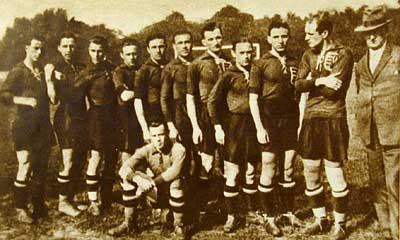Károly Fogl on:
[Wikipedia]
[Google]
[Amazon]
Károly Fogl, also known as Károly Fogoly, "Károly Újpesti" and "Fogl II" (19 January 1895 – 12 January 1969) was a Hungarian  .
.
footballer
A football player or footballer is a sportsperson who plays one of the different types of football. The main types of football are association football, American football, Canadian football, Australian rules football, Gaelic football, rugby lea ...
and manager
Management (or managing) is the administration of organizations, whether businesses, nonprofit organizations, or a government bodies through business administration, nonprofit management, or the political science sub-field of public administra ...
. He represented the Hungary national team at the 1924 Summer Olympics
The 1924 Summer Olympics (), officially the Games of the VIII Olympiad () and officially branded as Paris 1924, were an international multi-sport event held in Paris, France. The opening ceremony was held on 5 July, but some competitions had al ...
.
Fogl was born in Újpest
Újpest (; , ) is the 4th District in Budapest, Hungary. It is located on the left bank of the Danube River. The name Újpest means "New Pest" because the city was formed on the border of the city of Pest, Hungary in 1838. Újpest was a village ...
(today part of Budapest
Budapest is the Capital city, capital and List of cities and towns of Hungary, most populous city of Hungary. It is the List of cities in the European Union by population within city limits, tenth-largest city in the European Union by popul ...
), Hungary. Between 1918 and 1929 he played 50 games and scored 2 goals for the Hungary national team as a right defender. Together with his younger brother, József Fogl III, the two Fogls formed the legendary "Fogl-gate" (Fogl-gát in Hungarian), an extremely powerful and tough defending formation for more than a decade. Fogl II won the 1929–30 season with Újpest
Újpest (; , ) is the 4th District in Budapest, Hungary. It is located on the left bank of the Danube River. The name Újpest means "New Pest" because the city was formed on the border of the city of Pest, Hungary in 1838. Újpest was a village ...
and served as a captain of the club for a decade.
After his player career, he went on to coach Sportklub Sofia and the Bulgaria national team. Later he managed Juventus Bucuresti and in 1937 he led Győri ETO to the Hungarian top division NB I for the first time in the club's history. He was manager of the Polish football club Warta Poznań
Warta Poznań () is a multi-sports club based in Poznań, Poland. The name means ''the Guard'' in Polish and also the name of the river Warta on which Poznań is located. As of the 2025–26 II liga, 2025–26 season, they compete in the II liga, ...
on three occasions: 1938-1939, 1947-1948 and 1950-1951, leading the club to their second national championship title in 1947.
He died on 12 January 1969 in Budapest.
 .
.
Honours
Warta Poznań *Ekstraklasa
(; meaning "Extra Class" in Polish), officially known as PKO Bank Polski Ekstraklasa due to its Sponsor (commercial), sponsorship by PKO Bank Polski, is a professional association football league in Poland and the highest level of the Polish foo ...
: 1947
It was the first year of the Cold War, which would last until 1991, ending with the dissolution of the Soviet Union.
Events
January
* January–February – Winter of 1946–47 in the United Kingdom: The worst snowfall in the country i ...
References
1895 births 1969 deaths People from Újpest Men's association football defenders Hungarian men's footballers Footballers at the 1924 Summer Olympics Hungary men's international footballers Olympic footballers for Hungary Újpest FC players Hungarian football managers Győri ETO FC managers Bulgaria national football team managers Polonia Warsaw managers Warta Poznań managers Hungarian people of German descent Hungarian expatriate football managers Expatriate football managers in Bulgaria Hungarian expatriate sportspeople in Bulgaria Expatriate football managers in Poland Hungarian expatriate sportspeople in Poland {{Hungary-footy-defender-stub